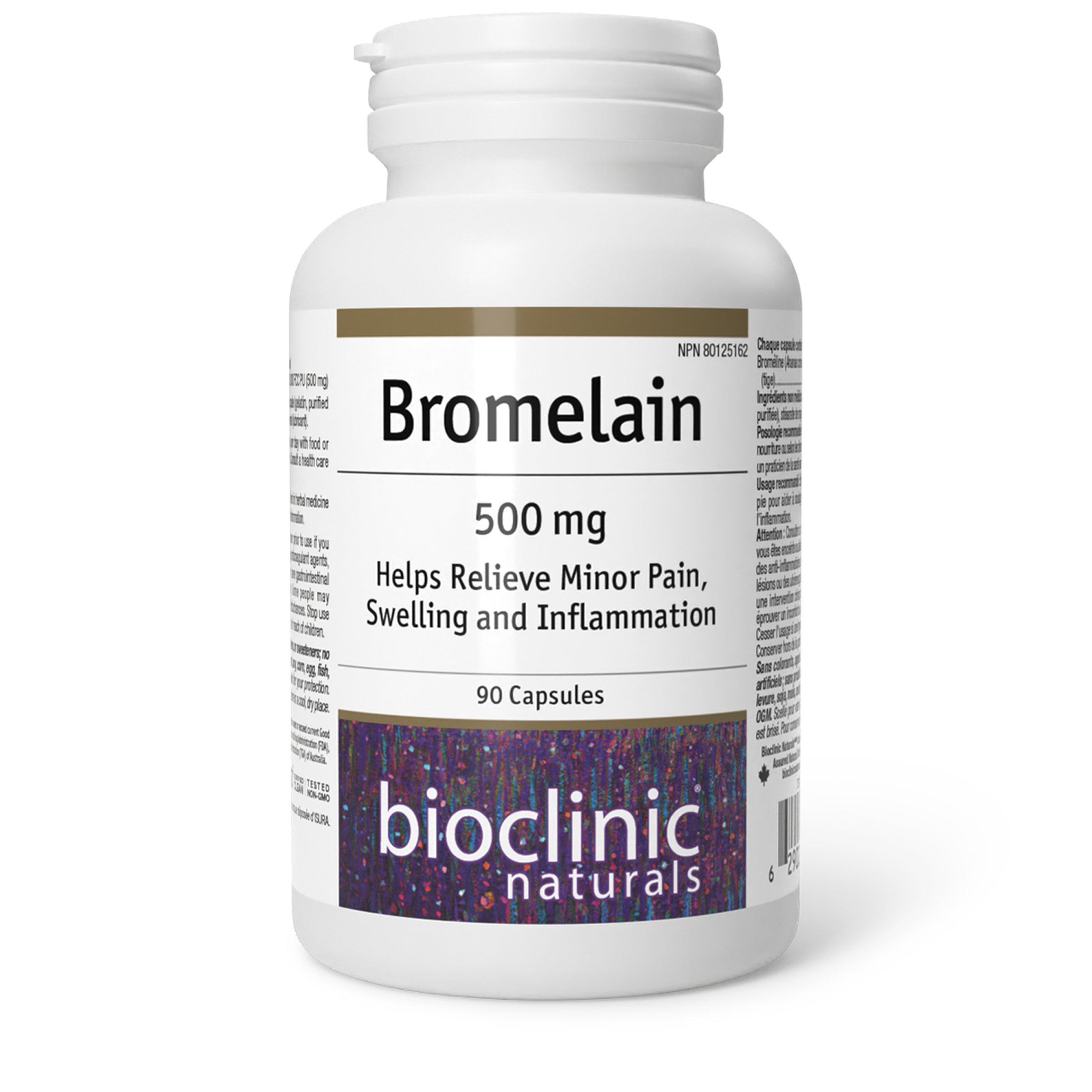
Helps relieve minor pain, swelling, and inflammation
500 mg
90 Capsules ( SKU: 9510 )
Benefits
- Provides 500 mg of bromelain from pineapple stems per capsule
- Supports healthy digestion by enhancing the breakdown of dietary proteins
- Provides the clinical dose used in controlled trials for supporting musculoskeletal health
- Bromelain is well-absorbed and retains enzymatic activity, allowing for systematic anti-inflammatory effects
Feature Summary
Bromelain, found in pineapple stems, is a combination of multiple proteolytic enzymes classified as cysteine or thiol proteinases. Bromelain’s long history as a digestive aid is partly attributed to its protein-digesting ability over a wide pH range. However, it has also been shown to stimulate pancreatic enzyme production and improve epithelial integrity in experimental models.1,2
In addition to its function as a digestive enzyme, bromelain has been shown to be absorbed in the digestive tract and retain its enzymatic activity in the blood.3 Among its many enzymatic effects, bromelain has been shown to be a potent anti-inflammatory agent, reducing levels of inflammatory signals, such as tumour necrosis factor (TNF) and nuclear factor-kappa B (NF-kappaB).4–6
Bromelain’s anti-inflammatory, fibrinolytic, and analgesic effects mediate many of its musculoskeletal benefits as well. In an open-label trial, bromelain supplementation was shown to reduce acute knee pain as well as stiffness and function, with a dose-dependent effect.7 In another clinical trial of mild/moderate knee osteoarthritis, bromelain had similar efficacy to standard therapy at four weeks. By 16 weeks, improvements in pain, stiffness, and function were observed with bromelain supplementation.8 More rapid recovery and reduction of pain and swelling following multiple types of minor trauma have been reported with bromelain as well.9–11
Medicinal Ingredients
| Each Capsule Contains: | |
| Bromelain (Ananas comosus var. comosus) (stem) | 7,500,000 FCC PU (500 mg) |
Non-Medicinal Ingredients
Gelatin capsule (gelatin, purified water), vegetable grade magnesium stearate (lubricant).
Dosage:
Recommended Adult Dose: 1 capsule per day with food or as directed by a health care practitioner. Consult a health care practitioner for prolonged use.
Warnings:
Consult a health care practitioner prior to use if you are pregnant or breastfeeding, are taking anticoagulant agents, anti-inflammatory agents, or antibiotics, have gastrointestinal lesions/ulcers, or are having surgery. Some people may experience gastrointestinal discomfort/disturbances. Stop use if hypersensitivity/allergy occurs. Keep out of reach of children.
Allergens:
Contains no artificial colours, preservatives, or sweeteners; no dairy, starch, sugar, wheat, gluten, yeast, soy, corn, egg, fish, shellfish, salt, tree nuts, or GMOs.
Contraindications
Should be used with caution in individuals with a pineapple allergy.12
Drug Interactions
Bromelain has been reported to increase the concentration of several antibiotics, potentially increasing their effectiveness.10 Theoretical interactions with anticoagulant medications exist, though none have been substantiated.13
- Varilla, C., Marcone, M., Paiva, L., et al. (2021). Bromelain, a group of pineapple proteolytic complex enzymes (Ananas comosus) and their possible therapeutic and clinical effects. A summary. Foods, 10(10), 2249.
- Kostiuchenko, O., Kravchenko, N., Markus, J., et al. (2022). Effects of proteases from pineapple and papaya on protein digestive capacity and gut microbiota in healthy C57BL/6 mice and dose-manner response on mucosal permeability in human reconstructed intestinal 3D tissue model. Metabolites, 12(11), 1027.
- Castell, J.V., Friedrich, G., Kuhn, C.S., et al. (1997). Intestinal absorption of undegraded proteins in men: Presence of bromelain in plasma after oral intake. Am J Physiol, 273(1 Pt 1), G139-46.
- Onken, J.E., Greer, P.K., Calingaert, B., et al. (2008). Bromelain treatment decreases secretion of pro-inflammatory cytokines and chemokines by colon biopsies in vitro. Clin Immunol, 126(3), 345-52.
- Bhui, K., Prasad, S., George, J., et al. (2009). Bromelain inhibits COX-2 expression by blocking the activation of MAPK regulated NF-kappa B against skin tumor-initiation triggering mitochondrial death pathway. Cancer Lett, 282(2), 167-76.
- Pezzani, R., Jiménez-Garcia, M., Capó, X., et al. (2023). Anticancer properties of bromelain: State-of-the-art and recent trends. Front Oncol, 12, 1068778.
- Walker, A.F., Bundy, R., Hicks, S.M., et al. (2002). Bromelain reduces mild acute knee pain and improves well-being in a dose-dependent fashion in an open study of otherwise healthy adults. Phytomedicine, 9(8), 681-6.
- Kasemsuk, T., Saengpetch, N., Sibmooh, N., et al. (2016). Improved WOMAC score following 16-week treatment with bromelain for knee osteoarthritis. Clin Rheumatol, 35(10), 2531-40.
- Aiyegbusi, A.I., Duru, F.I., Anunobi, C.C., et al. (2011). Bromelain in the early phase of healing in acute crush Achilles tendon injury. Phytother Res, 25(1), 49-52.
- Hikisz, P., & Bernasinska-Slomczewska, J. (2021). Beneficial properties of bromelain. Nutrients, 13(12), 4313.
- Rathnavelu, V., Alitheen, N.B., Sohila, S., et al. (2016). Potential role of bromelain in clinical and therapeutic applications. Biomed Rep, 5(3), 283-8.
- Knox, S., Lang, D., & Hoyt, A. (2019). The many flavors of pineapple reactions. Ann Allergy Asthma Immunol, 123(5), 519-21.
- Eckert, K., Grabowska, E., Stange, R., et al. (1999). Effects of oral bromelain administration on the impaired immunocytotoxicity of mononuclear cells from mammary tumor patients. Oncol Rep, 6(6), 1191-9.
